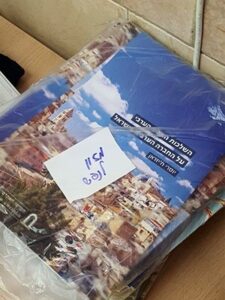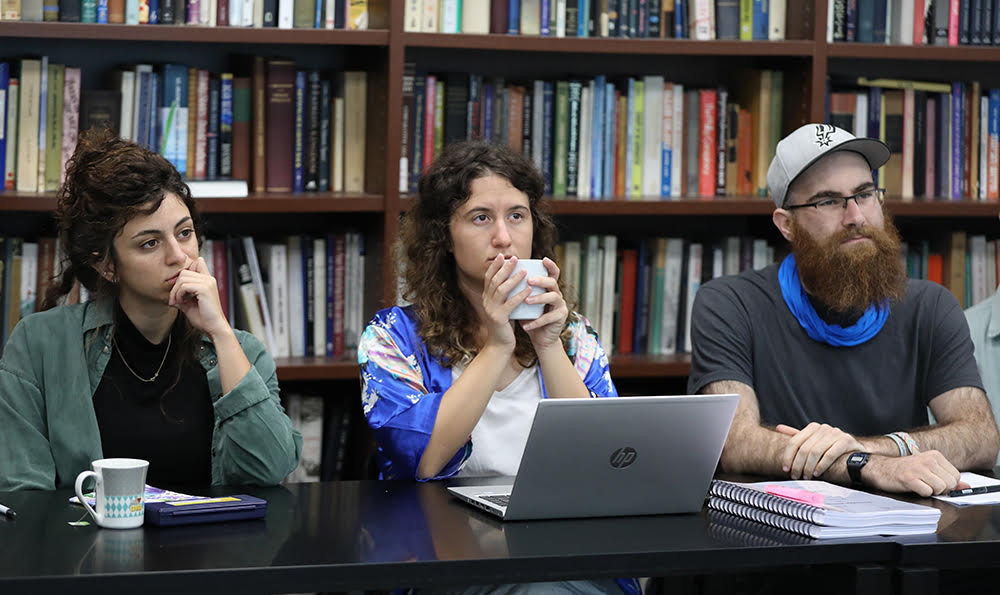Food for Hearts and Minds: Shalem Brings Ideas (and Meals) to the Front Lines

It all started, like most things at Shalem, with a book. A Great Book, to be precise.
“Before October 7th, we had planned to go to an army base in the Negev to install a Shalem Library,” explains Director of Partnerships Tamar Fuks, referring to the college’s national network of free lending libraries stationed along Israel’s National Trail and, in recent years, at outlying IDF bases as well. Containing a selection of classics alongside contemporary works of Hebrew literature, the libraries aim to enrich young Israelis’ service and journey of personal discovery. They also, especially in far-flung places, provide much-needed access to something to read.
“Several days after the Hamas attack, I was speaking with my contact at the base about postponing our visit. I said, ‘Listen, if we’re already talking, tell me what we can do for you right now that would help your soldiers,’” explains Fuks. “Without hesitating, he answered, ‘can you get them hot meals?’”
While the army ensures that all soldiers have battle rations, it’s common for those on the war’s front lines to go without hot meals. And now, adds Fuks, with so many combat units in Gaza, many soldiers can spend days without eating a single cooked thing. After recruiting a group of friends and volunteers, Fuks began preparing dozens of meals each day for delivery to soldiers stationed too far from a base kitchen. On impulse—to make the meals as filling as possible, she jokes—she added a Shalem essay to each wrapped package.
“I wanted to give as much as I could, to send a message that beyond the food itself, we were sending love and strength and concern for them as people, not just soldiers,” recalls Fuks. “I hoped the addition of an essay would express all that.”
The last thing she expected, she insists, was that the combination of real food and food for thought would become so popular, she’d be overwhelmed with requests for more. When officers at nearby bases heard about her service, “my first thought was, this is crazy, we’ll need to print tens of thousands more copies,” she says. “Then I thought, we must have the most intellectually curious army in the world,” she recalls with a laugh. “To this day, I’m not sure if it’s the food or the essay they like more.”

Tamar Fuks, Shalem’s director of partnerships, and a team of volunteers prepare hot meals for soldiers in Gaza.
Fortunately, along with the requests for more packages came offers of more help, too: The head of a yeshiva in the southern city of Netivot—located just nine miles from Gaza—called Fuks in the second week of the war to insist that until his students returned, she use their kitchen to cook soldiers’ meals.
Thanks to the larger facilities, Fuks was able to scale her operations dramatically; today, her kitchen produces several thousand meals a day, all of which come with a thank you and an essay from Shalem. As for meeting soldiers’ hunger for new ideas, Fuks says that that’s kept her almost as busy. Thankfully, she has a small army for that purpose as well.
“Soldiers have been treated to countless concerts and other performances that boost morale, but much less common are visits by lecturers who can connect what’s happening on the battlefield to history, Jewish thought, or our own identities. Shalem’s scholars have something very unique to offer in that space, and amazingly,” Fuks adds, “they’re willing to go absolutely everywhere to do it.”
Since the start of the war, Shalem lecturers and alumni have delivered more than 250 lectures to more than 10,000 soldiers in bases throughout the country, many along the northern border and even in the Golan Heights. “Once a Shalem graduate who’s now an officer in an elite Alpine commando unit called to ask if we could send scholar of Lebanese history Dr. Yusri Hazran to speak with a dozen or so soldiers stationed on Mt. Hermon. These soldiers are in the middle of nowhere, no one visits them. They’re totally off the radar,” Fuks says. “When I reached Yusri, he happened to be on his way back from another base at the border, where he had just finished speaking about Hezbollah. He said, ‘I can be there in thirty minutes.’ He literally turned the car around and went straight there.”

Shalem essays delivered with meals. The note says “food for the soul.”
Other Shalem lecturers who have spoken to soldiers around the country are Col. (res.) Dr. Eran Lerman, the architect of Shalem’s new major in Strategy, Diplomacy, and Security; Dr. Michal Levy, a lecturer in philosophy; and Dr. Ido Hevroni, who dedicated a recent essay about the Iliad to Major Amir Sekori z”l, a student at Shalem who was killed on October 7th while attempting to battle Hamas terrorists. To meet the enormous demand for Shalem content—“As soon as a lecture is finished, the officers are already calling to book the next one,” says Fuks—Shalem alumni have been recruited to the cause, too. For example, graduate and poet Noa Sorek recently taught a workshop on creative writing and prayer to displaced families, and Paul Zafarti, who spent two years at Israel’s Permanent Mission to the United Nations, spoke to overseas visitors about Israel’s wars from Kissinger to today.
“When this war is over, I can’t believe there will be a single soldier who won’t have heard of Shalem,” states Fuks. Pointing out that her initial goal with the Shalem Library was to make great ideas accessible to soldiers in out-of-the-way bases, she expresses gratitude for the opportunity to reach so many more soldiers than she’d ever hoped.
“The question I asked in the days right after the attack hasn’t changed. I wondered what I could give our soldiers that they need right now. It turns out that along with physical sustenance, they need the intellectual kind, too. They’re young people who have been thrust into battle, and they want meaning and understanding,” Fuks concludes. “And as long as they want it, Shalem is here to help.”



